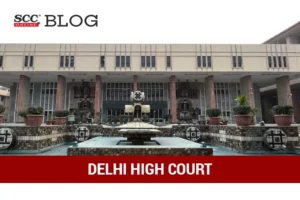Delhi High Court: In a case wherein an application was filed under Section 439 of Criminal Procedure Code, 1973 (‘CrPC’) seeking regular bail in a case where FIR was registered under Sections 328, 376 and 506 of Penal Code, 1860 and Section 6 of Protection of Children from Sexual Offences Act, 2012, a Single Judge Bench of Swarana Kanta Sharma, J.* after considering the fact that the petitioner was continuously threatening and blackmailing the prosecutrix, held that it was not inclined to grant any relief to the petitioner. The Court further directed DSLSA to formulate a programme to educate students, potential vulnerable victims as well as educate teenagers posting intimate content on social media without consent of the person concerned, violates the law.
Background
In the present case, a FIR was registered on the complaint of the prosecutrix wherein she had alleged that she had met and had become friends with the petitioner, after which, they had started talking to each other on phone and gradually had fallen in love with each other. It was alleged that one day, the petitioner had called the prosecutrix to his house and when she had reached there, the petitioner had offered her juice in a glass and after drinking the juice, the prosecutrix had become unconscious and upon gaining consciousness, she had found herself lying naked. The petitioner had thereafter told the prosecutrix that he had made physical relations with her and had also videographed the same. It was also alleged that the petitioner had threatened the prosecutrix to keep quiet, or else he would post the pictures and videos on social media. Under such threat, the prosecutrix had continued to talk to him. It was further alleged that a year back, the petitioner had again made physical relations with her, and he was now forcing her to marry him by changing her religion.
Analysis, Law, and Decision
The Court noted that the record revealed that the petitioner had not only made physical relations with the prosecutrix on the pretext of getting married to her and had continued to do so, but he had also videographed the same. Thereafter, he had kept on sexually assaulting her after threatening her that the photographs of their sexual relationship and videos of the same would be uploaded on the social media. The prosecutrix, therefore, in the present case was put under threat of being defamed and embarrassed by posting the photographs and the video on social media. The Court further noted that the prosecutrix in her statement, recorded under Section 164 of CrPC, had stated that the petitioner had exploited her, taking advantage of her trust upon him that he would get married to her and had continued to sexually abuse her. Thereafter, by blackmailing her, he continued to sexually abuse her. Therefore, due to such conduct, she had asked him that she did not want to have any relationship with him, however, he had again threatened her that he would reveal everything to her parents.
The Court thus opined that the present case did not fall under the category of those cases where the relationship was consensual without any threat or criminality. The Court further opined that this case was of sexual assault based on preparing inappropriate videos and photographs of the prosecutrix which belied the claim of the counsel for the petitioner that it was an innocent teenage mutual love between the parties. The Court opined that if this would have been the case of teenage mutual love, then the petitioner would not have prepared/recorded inappropriate intimate videos and photographs of himself and the prosecutrix to threaten to post them on social media. Furthermore, the petitioner also threatened the prosecutrix’s family by going to their home and throwing eggs and stones at their house.
The Court further opined that “had it been a case of consensual adolescent mutual love as argued by the counsel for the petitioner, it would have no place of abusing, blackmailing, inducement, threat, violence, pressurizing and threatening the prosecutrix to convert to his religion for the purpose of forcibly getting married to her even when she wanted to get out of the abusive relationship. She was put under fear and threat of social shaming of herself and her family, which did not indicate that it was a consensual innocent adolescent mutual love relationship”.
The Court, after considering the fact that the petitioner was continuously threatening and blackmailing the prosecutrix, held that it was not inclined to grant any relief to the petitioner at this stage. The Court further requested Delhi State Legal Services Authority (‘DSLSA’) to formulate a programme whereby they might educate the students, potential vulnerable victims as well as educate the teenagers who might indulge in such crimes without knowing that posting such intimate content on social media without consent of the person concerned was in violation of law.
[Sakib Ahmed v. State (NCT of Delhi), 2023 SCC OnLine Del 2769, decided on 11-5-2023]
Advocates who appeared in this case :
For the Respondent: Rupali Bandhopadhya, ASC; Akshay Kumar, Abhijeet Kumar, Advocates;
*Judgment authored by: Justice Swarana Kanta Sharma

